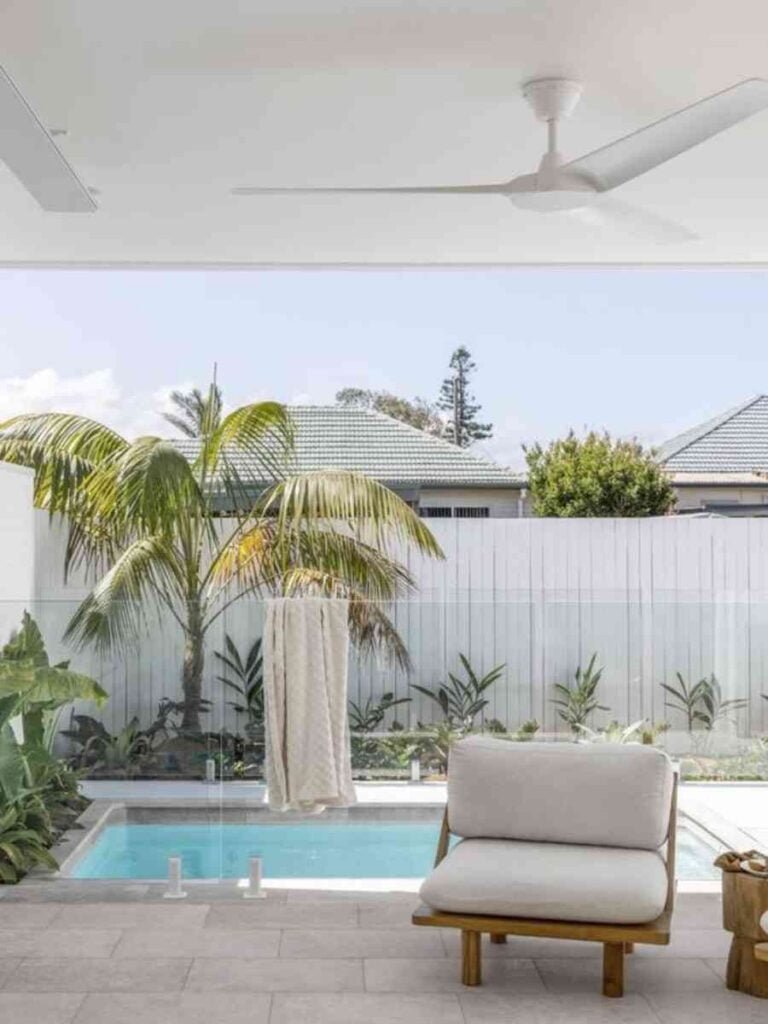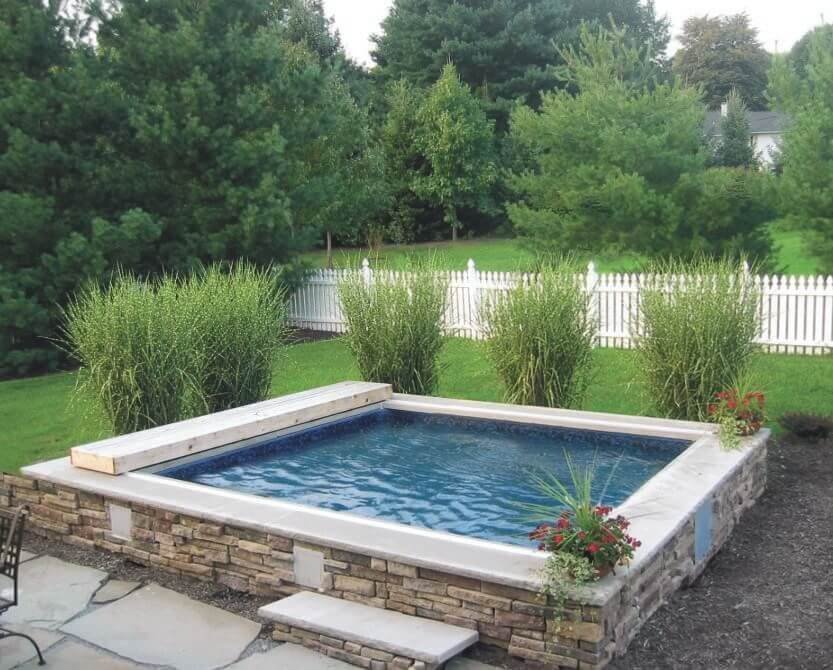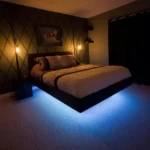Having a plunge pool in your backyard has many uses beyond just providing a place to cool off for a few minutes.
Plunge pools are ideal for households with limited space, while being much smaller than a standard swimming pool. Some of the best reasons to put in a plunge pool in your backyard are as follows:
1. Cool Off Quickly
The ability to swiftly cool yourself on hot days is one of the greatest advantages of a plunge pool. Plunge pools are shallow enough that you can totally submerge your body while sitting or standing.
Unlike larger pools, the water in these smaller ones can cold far more quickly. On hot summer afternoons, a refreshing dip in the pool is the perfect way to cool off. Instead of waiting for a large pool to cool down, you may get some relief from the heat in a matter of minutes.
2. Take a Quick Dip Anytime
Plunge pools don’t require as much time to filter and chemically treat as regular swimming pools do because they hold less water. Without having to wait for chemicals to circulate, you may take advantage of a sanitary soak whenever you like.
Plunges are generally warmer than larger pools overnight due to the rapid turnover rate, making them ideal for revitalizing morning swims. Fast filtration and low surface area make it simple to keep water in good condition.
3. Easy Installation
Full-sized pools necessitate elaborate piping and pump systems, as well as sophisticated filtration equipment, as well as the excavation of a sizable pit.
Plunge pools, on the other hand, require little more than digging a small pit, lining it, and installing a simple heating and filtration system. Many versions of prefabricated fiberglass plunge pools have all the necessary features built into the liner.
Most installations just take a day or two to complete and cause minimal damage to surrounding vegetation. This miniature design is ideal for urban yards.
4. Lower Cost
Plunge pools are more cheap than large, custom-built pools because of their streamlined building process. Much less time, effort, and resources are needed to excavate.
A large, custom-built gunite pool can cost ten times as much as a small, prefabricated fiberglass plunge pool. Because less water is required, less money is spent on related expenses like heating, pumping, and chemicals.
Low-maintenance costs are another benefit of simpler filtration systems. Plunge pools are affordable enough for almost any household.
5. Increased Safety

For youngsters and shorter adults, plunge pools are preferable to deep swimming pools. Because of its shallow shape, nearly everyone can stand up in it with their heads completely above water.
When opposed to huge pools with deep ends, the risk of accidental drowning is significantly reduced. Because there is less water, there is less of a chance that someone will fall.
And because of its small size, unsupervised access can be easily denied. Plunge pools are shallow enough for swimming and relaxing without compromising safety.
6. Better Retention of Heat
Plunge pools are ideal for saving energy because of their low water volume and shallow depth. Due to its small size, it just requires a few solar panels or a minimal gas heater to maintain a comfortable water temperature.
The larger the pool, the more effort and energy is required to keep the water heated throughout the night. However, a plunge pool can be kept warm without using much energy at all. And its cost-effective heating makes them perfect for regions with a brief swimming season.
7. Fun Soaking Experience
Plunge pools are too small for swimming laps, but they are perfect for lounging, wading, and playing. You can completely submerge yourself while sitting still.
And you may lie back comfortably against the tall walls. Plunge pools are more for relaxing and soaking than for competitive swimming.
With the addition of fountains or waterfalls, your yard can be transformed into a peaceful haven.
8. Small Footprint and Flexible Shapes
Plunge pools pack all the fun of a swimming pool into a space that won’t take up much room in your garden. Due to its compact size, there will still be plenty of room in your yard for additional features and landscaping.
Plunge pools can be designed in any way you like, from curvy to geometric, and don’t need a big rectangular excavation.
It is possible to install a small, above-ground model directly on top of some preexisting patios or decks. Tiny plunge pools can be formed in any design and set in any location.
9. Increased Property Value
Adding a pool of any kind can increase your home’s value by about 7 percent. Plunge pools, on the other hand, offer a remarkable return on investment due to the substantial value they add at a cheaper cost to install.
In addition, prospective purchasers can feel secure touring these homes because of their compact size and lack of obstacles to entry.
Buyers with a desire for a pool but restricted outdoor space are also attracted to plunges. Plunge pools are a worthwhile investment before selling your home, both for the increased value and for the space they save in the yard.
10. Better Water Conservation

During times of drought, several municipalities have limits on how often residents can fill their swimming pools. Draining and refilling a large pool can use up to many thousands of gallons.
However, a plunge pool may only require around 2000 gallons, letting you frequently replace the water without exceeding your allotment. Also, because of its low storage capacity, less water is lost through evaporation.
Furthermore, water runoff from a spillover spout can be collected and used for plant irrigation. Less water is wasted in plunge pools.
11. Year-Round Swimming
Plunge pools are ideal for colder climates since they are so easy to heat and have such a low thermal mass. Plunge pools are perfect for a refreshing swim year-round, even when regular pools are too cold to enjoy.
If you can afford the room, chemicals, upkeep, and energy to keep your pool open all year, you should. With a pool cover, you may enjoy your pool at any time of year.
12. Easy to Maintain Balance
Maintaining the right chemical balance in a swimming pool can be difficult due to the volume of water involved. In large pools, it might take a long time for the chlorine or pH to return to acceptable levels if the calibration is off.
Chemicals can spread quickly in a plunge pool because of its limited volume. It takes little effort to maintain optimal chemistry, and imbalances can be quickly remedied.
It’s easy and cheap to keep an eye on such levels with test strips. In addition, unlike larger pools, a disinfecting chlorine residual can be attained in a matter of minutes.
13. Better Filtration
Cartridge filtration systems, which are used in most plunge pools, are far easier to maintain than sand or DE filters and provide crystal-clear water. Cartridges can be removed and washed to eliminate dust and debris as needed.
Their small size also facilitates the installation of many redundant filters, which results in enhanced particle capture.
Plunge pools are able to maintain their pristine condition despite their low water volume and several cartridge systems. As opposed to a big pool, you won’t have to vacuum this as regularly.
14. Space for Exercise
It is possible to swim in situ as an exercise in some plunge pool models because of their width. Resistance training in water is great for cardio and light range-of-motion exercises.
Strength is gained while joint stress is reduced when doing water aerobics. Tethering anchors allow you to attach resistance paddles or foam weights to the wall. Even if you can only swim a short distance, walking back and forth counts as exercise.
Mobility difficulties are often eased by exercising in water. Plunges allow people with a small yard to enjoy the benefits of swimming.
15. Customizable Options
Size, shape, depth, and ancillary elements can be adjusted to create a personalized plunge pool experience. Pick a shape, such as a corner, oval, circular, or freeform.
Add lighting, fountains, and waterfalls to your pool design. Benches are already installed, and sun shelves provide a place to lie down. Install a spout that overflows to conserve water.
Temperature and sanitation can be maintained with the aid of heat pumps, automatically closing covers, and spillways. You may personalize the look and the functionality to make your garden into a place like no other.
16. More Usable Backyard Space

If you’re looking to maximize the amount of usable area in your backyard, a plunge pool is a great option. The remaining space can be used for anything else, such as a garden, a play area, an outdoor kitchen, or a dining area.
Having a swimming pool in your backyard doesn’t necessitate digging up your entire grassy yard. Those who don’t require access to the pool can keep their children and pets safely in the yard.
You can enclose it and still have room for a trampoline or a swing set. The whole family can have fun in the water of a plunge pool.
17. Inspired Gathering Spot
Small but perfectly formed plunge pools make for great backyard gathering spots. Surrounding the little pool with seating spaces makes it a stylish focal point.
Put some lounge chairs in the open area so that people can relax and take in the sun. Guests may easily transition between the pool and patio thanks to the proximity of the outdoor kitchen and eating area.
The dramatic lighting at night makes the neighborhood a unique spot for socializing after dark. When hosting large groups, a small pool allows for simple access management. The plunge pool creates an intimate gathering space.
18. Perfect for Empty Nesters
When the kids move out, it might be difficult for a couple to justify the cost and upkeep of a large backyard pool. Plunge pools, on the other hand, allow retirees to relax in a bath without having to heat and maintain a large pool they won’t use.
The reduced energy and chemical needs are a result of the compact design. A plunge pool requires little upkeep and is always ready for an impromptu swim. Plunges are a great alternative to large pools for retirees who want to make better use of their outside area.
19. Soothing Stress Relief
Relaxing in soothing warm water can do wonders for relieving tension and stress. Your backyard can be a haven of calm and relaxation after a long and trying day.
The healing effects of water therapy can be enjoyed in the privacy of your own home whenever you like with a private pool. Relax with some deep breathing while you watch the stars reflected in the water.
There’s something soothing and meditative about the water’s constant temperature and buoyancy. The benefits of taking numerous, brief dips are considerable.
20. Upgrade Underutilized Areas
Many houses have awkwardly shaped backyards, terraces, or patios that would benefit from a small plunge pool. Because of its small profile, it may be placed in previously unused corners of your yard.
Plunge pools, even tiny ones in oddly shaped corners, can be a lot of fun. A prefabricated pool kit works great when installed on a rooftop deck.
Or build a whole new gathering area to take the place of a worn-out patio. Plunge pools are a great way to increase the value of unused outdoor space.
21. Perfect for Pools & Spas
Adding a spa or plunge pool to a house that already has a large swimming pool is like getting the best of both worlds. Take advantage of the large pool for some laps, some games, and some poolside celebrations.
Soothe tired muscles in the heated sanctuary of the plunge pool. Little ones can safely splash around in the warmer spa-like water, which is also great for adults.
It’s also helpful to have a smaller pool that can be kept warm for those times when the main pool is unusable due to low temperatures. Enjoy the luxuries of a backyard resort.
22. Limitless Design Options
Plunge pools, because of their small size, lend themselves to practically any aesthetic. Try out a minimalist geometric style. Construct a verdant, tropical oasis.
Use bamboo, plants, and river stones to create a sophisticated zen garden atmosphere. The surface of the pool can be decorated with colorful tiles, glass mosaic highlights, natural stone, or even beachy shells.
Vintage wood fencing or aged brick paving stones complete the style. Your own unique sense of style can be reflected in the design of your plunge pool.



